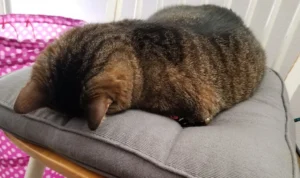Cats and cucumbers or zucchinis may not seem like they have much in common, but there’s a strange and fascinating phenomenon that connects them. Have you ever wondered why cats seem to be frightened by these harmless vegetables? Let’s delve into the reasons behind this peculiar fear.
Evolutionary Instincts
Cats’ fear of cucumbers or zucchinis can be traced back to their evolutionary instincts. In the wild, cats are naturally wary of unfamiliar objects or potential threats that could harm them. When a cucumber or zucchini is unexpectedly placed behind them while they are eating or sleeping, it triggers a primal fear response. This reaction is rooted in their survival skills, where anything unknown or sudden could be perceived as a danger.
One unique angle to consider is that the shape and color of cucumbers or zucchinis may resemble a snake to a cat, which is a common predator in their natural habitat. This resemblance can further amplify their fear response, as the instinct to flee from a snake-like object is deeply ingrained in their genetic makeup.
Unexpected Encounters
The element of surprise plays a significant role in why cats are afraid of cucumbers or zucchinis. Cats are creatures of habit and thrive on predictability in their environment. When they encounter a cucumber or zucchini suddenly appearing behind them, they are caught off guard, triggering a fear response. This sudden disruption to their routine can cause stress and anxiety, leading to their instinctual reaction of avoiding or fleeing from the perceived threat.
Additionally, the contrast between the silent, stealthy nature of a cat and the sudden appearance of a cucumber or zucchini creates a jarring experience for them. The unexpected nature of this encounter can be overwhelming and heighten their fear response.
Remember, never purposefully scare your cat with these vegetables for a laugh, as it can cause unnecessary stress and anxiety for your furry friend.
Size Matters
Cats may perceive cucumbers or zucchinis as potential threats due to their size and shape. These elongated veggies can resemble snakes or other predators in the wild, triggering a natural fear response in cats. Their instinctual survival mechanism kicks in when they encounter something large and unfamiliar sneaking up behind them, even if it’s just a harmless vegetable. So, when your feline friend sees a cucumber or zucchini appear out of nowhere, their instinct tells them to be cautious and on high alert.
Unfamiliar Objects
Cats are naturally cautious animals, always approaching new objects with a sense of curiosity mixed with hesitation. When faced with a cucumber or zucchini placed silently behind them, their instinct to be wary of unfamiliar objects is heightened. These veggies aren’t part of their everyday environment, so seeing them suddenly appear can trigger fear and stress in cats. It’s like when you stumble upon something unexpected in a dimly lit room – your heart skips a beat, and you’re on edge. The same goes for cats and their surprising encounters with cucumbers or zucchinis.
Additional Insight:
- Cats also rely heavily on their sense of smell to navigate their surroundings. Cucumbers and zucchinis may give off a scent that cats find unfamiliar or potentially threatening, adding to their fear response towards these veggies. So, it’s not just the sight of the cucumber but also its smell that can spook your kitty.
Predator vs. Prey
Cats have an innate predator-prey instinct, dating back to their wild ancestors. When a cucumber or zucchini suddenly appears behind them, it triggers their natural reaction to potential danger. This unexpected intrusion mimics a snake-like shape, evoking fear in cats as snakes are a real threat in the wild. Their startled response is an instinctive survival mechanism, causing them to be on high alert and ready to flee.
Additional Insight:
- Cats tend to be more fearful of objects placed silently behind them, as they rely heavily on their acute senses, making surprise encounters even more startling for them.
Sensory Overload
Imagine you’re peacefully munching on your favorite snack, only to turn around and find a large, unknown object looming towards you – wouldn’t you feel a bit overwhelmed? Well, that’s exactly how cats might feel when they spot a cucumber or zucchini sneakily placed near them. The unfamiliar sight, combined with their heightened senses, can create a sensory overload for cats, leading to a fear response.
Remember, cats perceive the world differently from us, and what might seem harmless to us can be a perceived threat to them. By understanding their natural instincts and sensory experiences, you can help create a safe and comfortable environment for your feline friend.
Phobia Development
Have you ever wondered why cats seem to be afraid of cucumbers or zucchinis? One possible reason is the development of phobias through negative associations. Cats may perceive these elongated green vegetables as potential threats due to their unfamiliar shape and sudden appearance. This unexpected intrusion into their environment can trigger a fear response as they associate the presence of cucumbers or zucchinis with danger. Cats may interpret them as snakes or other predators, causing them to feel anxious and stressed. Consequently, this negative association can lead to a lasting fear of cucumbers or zucchinis.
Behavioral Conditioning
Repeated exposure to cucumbers or zucchinis in certain contexts can reinforce cats’ fear responses over time. For example, if a cat encounters a cucumber while eating or resting, it may startle the cat and cause it to associate the vegetable with a negative experience. As a result, the cat’s fear response becomes more pronounced with each encounter, leading to a heightened sense of anxiety and apprehension around cucumbers or zucchinis. This behavioral conditioning can solidify the cat’s fear and reluctance to approach or interact with these vegetables.
Additional Insight:
- Cats’ natural instinct to be wary of unfamiliar objects or sudden disturbances plays a significant role in their fear of cucumbers or zucchinis. This instinct stems from their survival mechanism in the wild, where vigilance towards potential threats could mean the difference between life and death. The sudden appearance of a cucumber, resembling a potential predator, triggers this instinctive response in cats, leading to fear and avoidance behaviors.
The Element of Surprise
Surprising a cat with a cucumber or zucchini can trigger a strong fear response due to the unexpected nature of the situation. Cats are naturally cautious animals, and when they turn around to find an unfamiliar object looming behind them, they may interpret it as a potential threat. This sudden scare can lead to anxiety and stress in cats, impacting their overall well-being. It’s essential to avoid intentionally startling your feline companion with cucumbers or zucchinis to prevent unnecessary distress.
Fun Facts
- Cats have a natural aversion to unfamiliar objects placed near them, which can be traced back to their instincts as hunters in the wild.
- The fear of cucumbers in cats gained viral attention due to videos showing cats leaping in fright after spotting a cucumber placed behind them.
- Zucchinis are less commonly used to startle cats compared to cucumbers, but they can produce similar fear reactions due to their elongated shape and unfamiliar scent.
- While it may seem amusing to witness a cat’s dramatic response to a cucumber or zucchini, it’s important to remember that causing unnecessary fear in your pet is not beneficial for their mental or emotional well-being.
Extra tip: If you notice your cat displaying signs of fear or anxiety, provide a safe and comfortable environment for them to help alleviate their stress.
Alex, a passionate animal lover, has experience in training and understanding animal behavior. As a proud pet parent to two dogs and three cats, he founded AnimalReport.net to share insights from animal experts and expand his knowledge of the animal kingdom.




